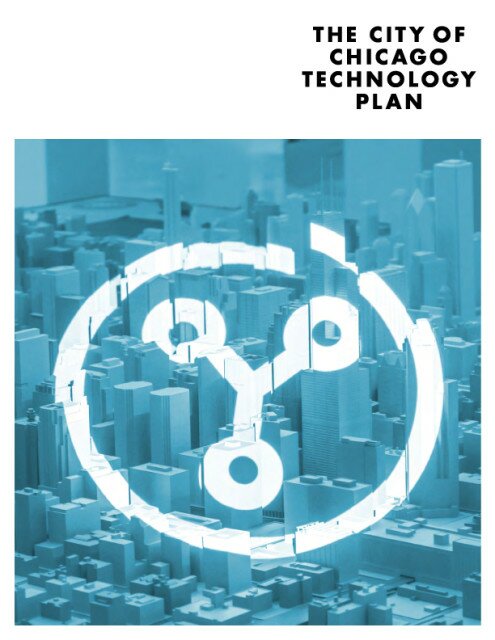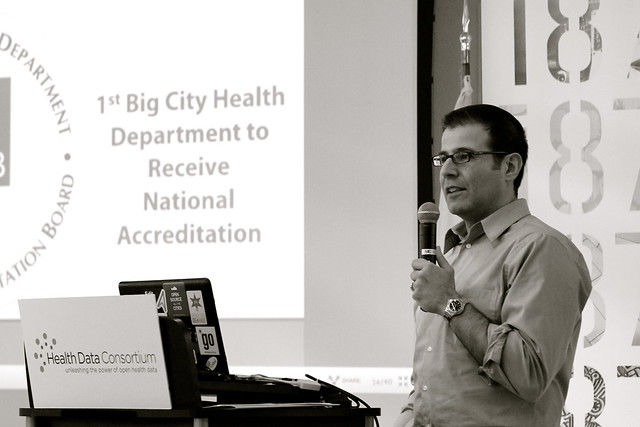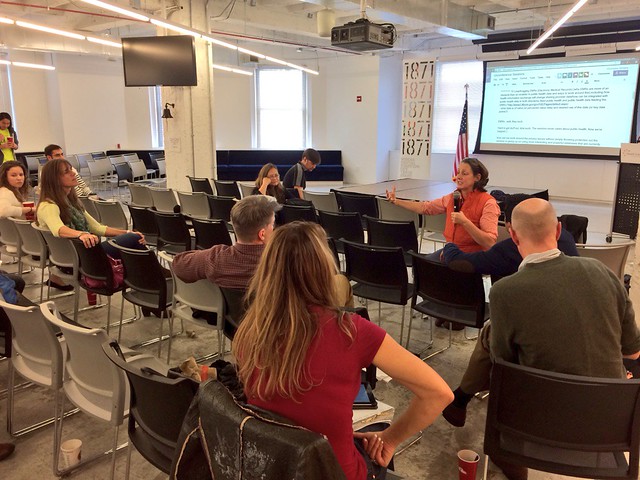 At Techweek, City of Chicago Chief Information Officer Brenna Berman announced an 18-month update to Chicago’s Tech Plan.
At Techweek, City of Chicago Chief Information Officer Brenna Berman announced an 18-month update to Chicago’s Tech Plan.
Chicago’s first Tech Plan was first launched in 2013 and laid out a strategy to establish Chicago as a national and global center of technological innovation.
Since it’s launch, Chicago’s civic technology community has made significant progress towards the goals of the tech plan.
As a civic organization devoted to improving lives in Chicago through technology, Smart Chicago is proud to be heavily involved in the implementation of Chicago’s Tech Plan.
Here are some highlights from the update.
Next Generation Infrastructure
Chicago is working with internal and external partners to improve the speed, availability, and affordability of broadband across the city. The City is preparing to create a Request for Proposal for companies to design, construct, implement, and manage a gigabit-speed broadband network.
In addition to broadband infrastructure, the city is also working to digitally connect it’s infrastructure. Part of this includes the launch of The Array of Things project which will place network of interactive, modular sensor boxes around Chicago collecting real-time data on the city’s environment, infrastructure, and activity for research and public use. (You can listen to their presentation at Chi Hack Night here.) You can already get up to the hour updates on beach conditions thanks to sensors maintained by the Chicago Park District. The Department of Innovation and Technology has loaded the information onto their data portal.
Make Every Community a Smart Community
One of the major efforts of the civic technology community in Chicago is closing the digital divide in every neighborhood.
Much of the work in the coming months will focus on Connect Chicago. This citywide effort, led by Smart Chicago in partnership with LISC Chicago, Chicago Public Library, World Business Chicago, and the City of Chicago’s Department of Innovation and Technology aligns citywide efforts to make Chicago the most skilled, most connected, most dynamic digital city in America.
Here’s more from the Tech Plan about the program:
As part of this initiative, program partners are creating a profile of a fully connected digital community that can be used as a benchmark and will provide best-practice toolkits and other resources to help all Chicago communities reach this benchmark.
If you’re interested in getting involved in – you should reach out or join the Connect Chicago Meetup!
Another big part of the City’s strategy to close the digital divide in Chicago involves the Chicago Public Library. Libraries around the city already function as public computing centers and now they provide Internet to Go – a program where residents can check out laptops and 4G modems so that they can access the internet at home.
The City of Chicago and the civic tech community is also heavily focused not only access, but on digital skills. The Chicago Public Library’s Cybernavigator Program is set to be expanded and Chicago Public School is working on implementing computer science curriculum at all schools.
On our end, Smart Chicago is working with Get In Chicago to run a youth-led tech program this summer. The conceptual model for this program is “youth-led tech”, which means teaching technology in the context of the needs & priorities of young people. Youth will learn how to use free and inexpensive Web tools to make websites and use social media to build skills, generate revenue, and get jobs in the growing technology industry. They will also learn about all sorts of other jobs in tech— strategy, project management, design, and so on.
Effective Government
The City of Chicago’s Department of Innovation and Technology is also making great progress in using data to help city government be more efficient and effective. One of their first projects, WindyGrid, is a geospatial Web application designed by the City’s Department of Innovation and Technology that strategically consolidates Chicago’s big data into one easily accessible location. WindyGrid presents a unified view of City operations—past and present—across a map of Chicago, giving City personnel access to the city’s spatial data, historically and in real time, to better coordinate resources and respond to incidents.
The City of Chicago will be open sourcing the project later this year on their Github page.
That’s not the only open source project that the city has on the books. Chief Data Officer Tom Schenk Jr recently spoke at Chi Hack Night to talk about their new system to predict the riskiest restaurants in order to prioritize food inspections. The system has found a way to find critical food safety violations seven days faster. Aside from the important aspect of less people getting sick from foodborne illness in the City of Chicago, there is another very important aspect of this work that has national impact. The entire project is open source and reproducible from end to end.
Since the release of the Tech Plan, Smart Chicago has been working with the Chicago Department of Public Health on the Foodborne Chicago project. Foodborne listens to Twitter for tweets about food poisoning and converts them into city service requests. The Tech Plan update has some results from the project.
A study of the system, published by the Centers for Disease Control, found that during March 2013 – January 2014, FoodBorne Chicago identified 2,241 “food poisoning” tweets originating from Chicago and neighboring suburbs. The complaints identified 179 Chicago restaurant locations; at 133 (74.3%) locations, CDPH inspectors conducted unannounced health inspections. A total of 21 (15.8%) of the 133 restaurants reported through FoodBorne Chicago failed inspection and were closed; an additional 33 restaurants (24.8%) passed with conditions, indicating that serious or critical violations were identified and corrected during inspection or within a specified timeframe.
Chicago’s open data portal is also getting expanded as part of the updated Tech Plan having grown by more than 200 data sets over the last two years. Chicago was the first City to accept edits to select data sets through the City’s GitHub account.
Open311 is also getting an upgrade with the city undergoing a procurement processes to build a new 311 system. As part of the process for upgrading 311, the new system will go through user testing through the Civic User Testing Group.
Civic Innovation
A big part of the city’s strategy around civic innovation is supporting the work of civic technologists here in Chicago. As part of the Tech Plan, Smart Chicago will continue to provide resources to civic technologists like developer resources, user testing, and financial support to civic technology projects.
The Tech Plan also calls out our work with the Chicago School of Data. The two day experience was wholly based on the feedback we received from dozens of surveys, months of interviews, and a huge amount of research into the work being done with data in the service of people. If you missed the conference, here are some of the key takeaways.
The Civic User Testing Group also plays a part in the Tech Plan and has recently been expanded to include all of Cook County.
Chicago Chief Information Officer Brenna Berman stated that Chicago has the strongest civic innovation community in the country. A large part of that community has been the Chi Hack Night, now in it’s fourth year with attendance now reaching over 100 people regularly.
Technology Sector Growth
One of the most thorny issues for civic technologist is the issue of government procurement. One of the things that the city has been doing is meeting with different groups to talk about ways the city can make it easier to buy products and services from smaller business and startups. (You can see Brenna Berman’s talk at the OpenGov Chicago Meetup here.)
As part of the Tech Plan, the City of Chicago is taking this on directly. Here’s the quote from the Tech Plan:
This summer, DoIT will release a Request for Qualifications for start-up and small-sized companies to join a new pool of pre-qualified vendors eligible for future City procurement opportunities. Companies who are deemed qualified will be placed into a pool and receive access to City contract opportunities in the areas of software application development and data analytics.
To further decrease the barriers facing smaller-sized companies in competing for City business, the City has modernized its insurance requirements to allow for pooled insurance plans. Start-ups that are members of an incubator, such as 1871, or smaller companies that come together for a group insurance plan, may now meet the City’s insurance requirements as a group. Insurance requirements were identified as a barrier to conducting business with the City in a series of listening sessions conducted over the past year with these companies.
This is a huge opportunity not only for civic tech companies, but it will enable the city to take advantage of the innovation coming out of these companies.
You can read the full tech plan here.



 At Techweek, City of Chicago Chief Information Officer Brenna Berman announced an 18-month update to Chicago’s Tech Plan.
At Techweek, City of Chicago Chief Information Officer Brenna Berman announced an 18-month update to Chicago’s Tech Plan.

